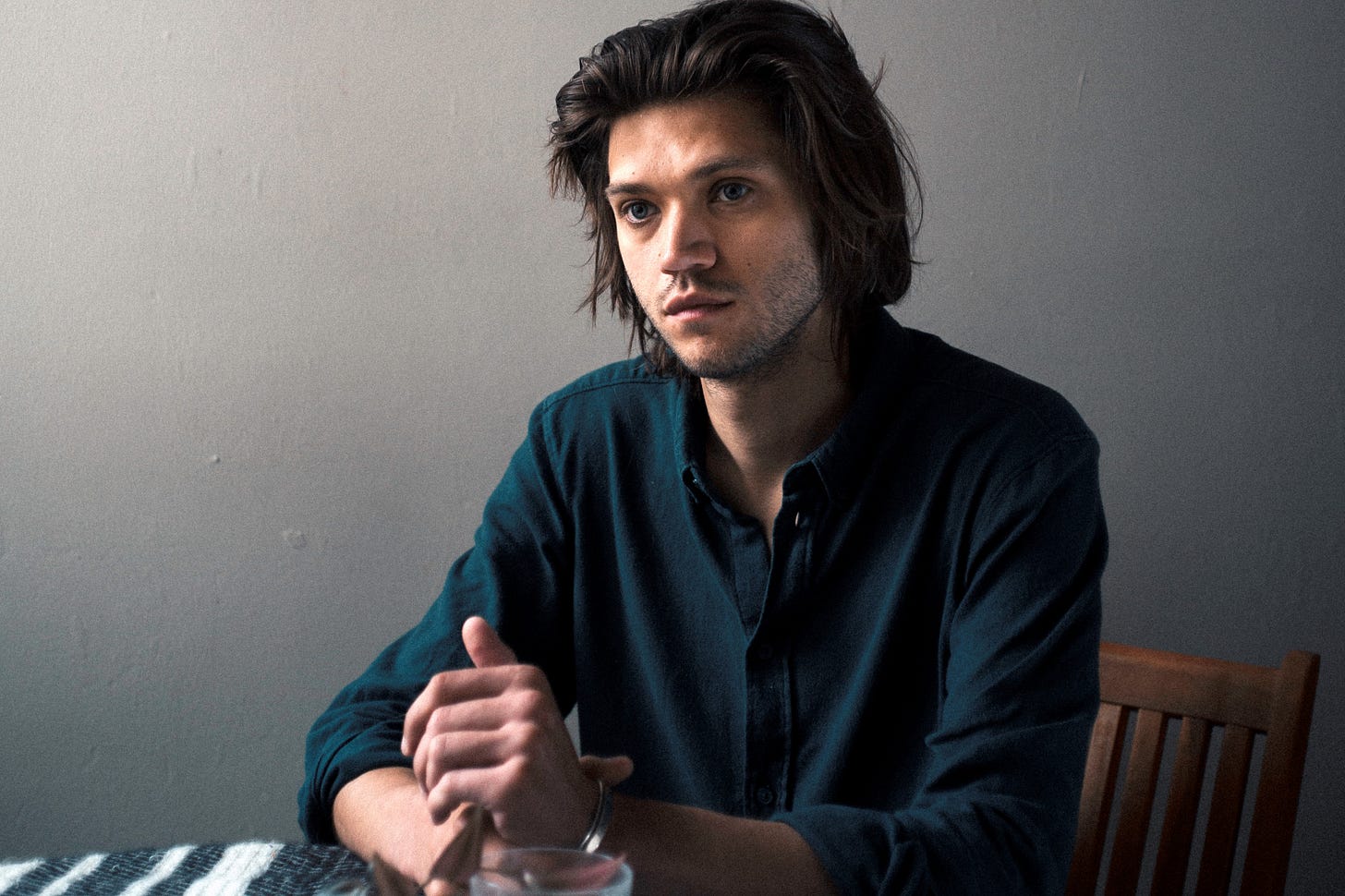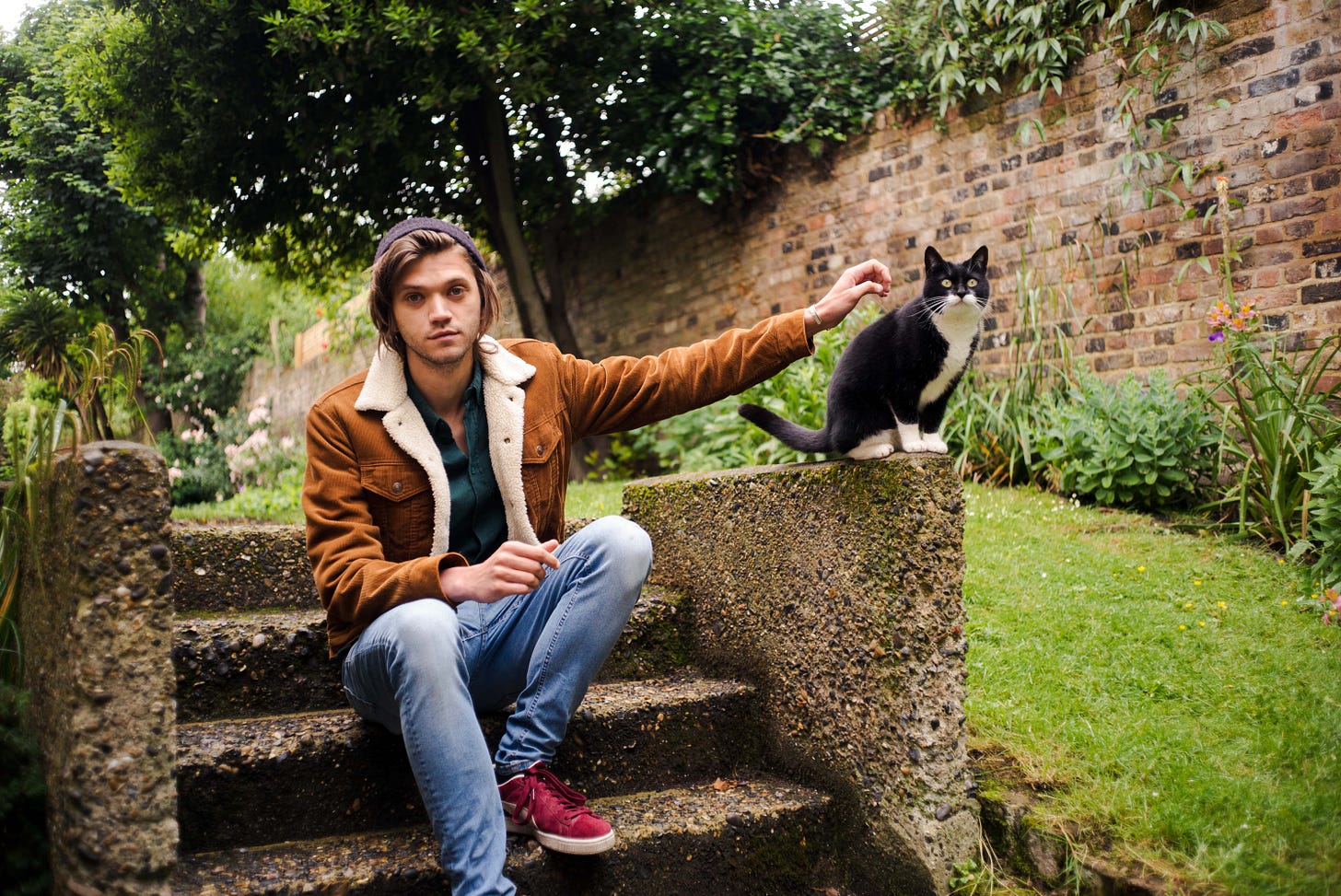Writer Tom Powell listens to the voices in his head.
The 2021 Papatango Prize-winner wants to work more collaboratively next.
Hello, and welcome to The Crush Bar, a weekly newsletter about theatre written by me, Fergus Morgan.
Each issue features an interview with an exciting, emerging theatremaker - and gives them a chance to be explicit about where they want to go and what help they need to get there. Maybe you, reader, can give it to them, or put them in touch with someone who can.
You can read more about why I’m doing this here, and you can sign-up to get it delivered straight to your inbox using the button below…
Tom Powell owes his writing career to a bike accident. He was a student, cycling home after a drinking competition with a friend, and he fell off.
“I went over the handlebars and smashed my face,” he remembers. “I was concussed and had to have a few stitches, and couldn’t speak for a little while, so I wrote instead. It was the first time I’d written longer stuff, specifically for the stage.”
Powell hasn’t stopped since. He put on some short plays while still an undergraduate, won a couple of awards, and completed Goldsmiths’ MA in Writing For Performance in 2014, then spent several years working as a tutor while he wrote as much as he could, earning spots in Soho Theatre’s Writer’s Lab and Southwark Playhouse’s Young Company.
He found things tough at times – “I worked antisocial hours and was broke” – but did develop an approach to playwriting that produced results. I Dare You, the first play he felt he “could stand behind”, was staged at Leicester Curve’s Inside Out Festival in 2018.
“For me, writing is very instinctive,” Powell says, typically thoughtful. “Some of the worst stuff I’ve written has been the most planned, and some of the best stuff has come quickly, from the heart and from the gut. There have been times when I’ve planned things at great length, stuck to that plan, and the results have been a bit disastrous.”
“Often I think about writing as a process of discovery,” he continues. “Sometimes, a line just pops into my head. I listen to it. I work out who is saying it and what their situation is. I listen a bit more, and the characters and the story start to reveal themselves.”
“ I sometimes think writing plays is a bit like tuning an old FM radio. You have to turn the dial and see what comes out clearest…”
Born in 1992, Powell grew up first in Bethnal Green – “I’m technically a Cockney, although I’ve lost the accent,” he says – then in rural Kent “in a small village where there were more livestock than people”. He remembers occasional trips to the theatre as a child – a production of A Midsummer Night’s Dream at the Barbican stays with him – but it was while studying sociology and politics - and recklessly riding bikes - at Cambridge University that he started to consider a career in the performing arts.
“I didn’t know if I could do it, but I wanted to try,” he says. “I know a lot of people who have had to put their hopes on hold, and whose lives are defined by regret. So I wanted to give it a shot, at least.”
Since his second play, Little Echoes, was staged at Islington’s Hope Theatre in 2019, things have really started to happen for Powell. He became Pentabus Theatre’s writer-in-residence, an emerging artist on the BBC’s New Creatives scheme, and was part of BBC Studios Writers’ Academy, an experience that allowed him to write episodes of Holby City and EastEnders, the latter of which is being broadcast later this year.
“My grandma is 91, and she can’t really hear or see anymore, but she’ll be able to watch my episode of EastEnders,” he says. “Hopefully it will make her proud.”
Then, earlier this year, Powell was one of three winners - from 1410 entrants - of the annual Papatango Prize with his two-handed play The Silence and the Noise, recently released as an hour-long audio drama. Featuring Aldous Ciokajlo-Squire as Ant, a boisterous county lines drug-runner, and Shakira Riddell-Morales as Daize, the distraught daughter of Ant’s local dealer, it’s a terrifically tender portrait of two troubled teenagers in a dangerous world.
“I read a lot about drugs and drug policy, as various members of my family have had addictions of different kinds,” Powell says. “It’s not about that at all, but that was the background context. I was on a train platform when the first line – ‘I could hurt you, you know?’ – came into my head. Then I just had to listen.”
“I try to write characters that I love,” he adds. “I try to ask urgent questions, then forget about them and let the characters lead the way. I sometimes think writing plays is a bit like tuning an old FM radio. You have to turn the dial and see what comes out clearest.”
What do you want to do?
At the moment, I’m basically writing until the money runs out. I’m redrafting a couple of plays and working on an original TV idea. I have a few weeks of R&D coming up on a play with Pentabus, too. It’s called Surfacing, and it’s about a rural CBT practitioner who nearly drowns, then, when she surfaces, the whole world is different, Alice In Wonderland-style. There might be some future plans for The Silence and The Noise, as well, but I’m reticent to say that for sure in case it doesn’t happen.
What I ultimately want is to build a career in theatre. What I want right now is to be making small and mid-scale shows. I think I’m writing some of the best stuff I’ve ever written, and I’ve got lots of different ideas that I would love to work on. I don’t want to be someone who just writes PDFs.
What support do you need to get there?
My writing has often met producers and collaborators quite late in the process. I would love to work with a director or a creative producer or a theatre from an earlier stage, and develop an idea together.
I sometimes perform spoken word poetry, too. Some thoughts and some stories suit different mediums. Sometimes that is theatre, sometimes that is poetry. So, if people have a festival or a gig where they need 10 to 30 minutes of strange, surreal, hopefully emotionally disarming material, get in touch.
How can people find out more about you?
They can watch my episode of EastEnders when it comes out. The Papatango Prize-winning audio plays, including The Silence and The Noise, are out on tour, with listening stations visiting loads of theatres over the next few months. Another short audio piece I wrote called Love Beyond The Zoo is available to listen to on the BBC website. And, hopefully, something I’ve written might be produced with Pentabus soon, too.
The Crush Bar is totally free and unfunded at present, so anything you can do to support it is hugely appreciated. There are three helpful things in particular: you can subscribe using the button above, you can share it, either on social media or by forwarding it to anyone who might be interested, and you can donate to my Ko-Fi account using the button below.
If you want to get in touch with me to ask about anything, or to suggest someone who deserves a shout-out in this newsletter, you can reach me on Twitter - I’m @FergusMorgan - or by simply replying to this email. That’s all for now. Back in a week. Thanks for reading.
Fergus Morgan




